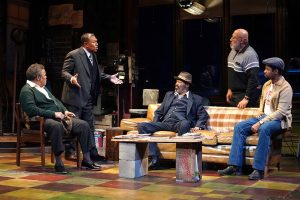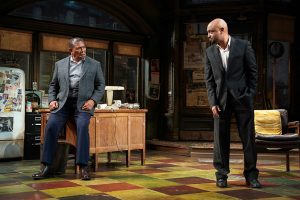At Globe, August Wilson’s ‘Jitney’ Shows It Belongs in Masterpiece Cycle
The late August Wilson was a great playwright forced by his integrity to concentrate on one aspect of the life around him: his race.
His solemn quest was to write a self-contained play, seen through the unique African-American lens, about each decade of the 20th Century. Before his untimely death at 60, he succeeded. But these 10 plays were far more than a neatly themed package. Fences is among the best American dramas we have. Others – The Piano Lesson, Ma Rainey’s Black Bottom – are now fixtures of the national repertoire. All are moving, authentic documents from inside a [private] world.
Jitney, the first play written (1982) but the last to reach Broadway, was extensively rewritten and re-premiered a couple of times before reaching its present form in a 2017 production directed by Ruben Santiago-Hudson for the Manhattan Theatre Club.
Whatever its shape may have been before, they’ve got it right now. Perfection may be impossible but here we come close. And the Old Globe Theatre is a beneficiary, presently the latest stop on a tour of several major U.S. theatre centers.
Wilson, entirely self-taught and gloriously parochial, set nine of the 10 plays in Pittsburgh’s Hill District (Ma Rainey takes place in a Chicago recording studio) where he lived as a child. Each play reflects the struggle of an underdog culture to survive and succeed in an alien environment.
In some ways, the 1970s of Jitney are at the crossroads of the cycle. The men bear scars from three separate wars but there’s peace for the moment. Opportunity is scarce but not unknown. Sin and politics are less the threat than poverty and gentrification. Even the racial divide seems more bridged.

Left to right, Ray Anthony Thomas, Steven Anthony Jones, Anthony Chisholm, Keith Randolph Smith and Amari Cheatom in August Wilson’s Jitney now at the Old Globe. Joan Marcus Photo
The jitneys of the title are gypsy cabs, part of a booming underground economy. If Yellow Cabs won’t come to the neighborhood, there are plenty of “car service” numbers to call for informal, unlicensed transportation. Drivers take the calls in strict rotation. When they’re idle, life still happens. The atmosphere is rich with the daily exchanges of Black America.
But the real heft of the play, filling in this piecrust, is the power and depths of urgent passion exposed and ignited from nearly every character. These people writhe with life and soar beyond any category, offering the audiences voyages of inner discovery to match the intriguing scenery.
Compromise eludes a father and a son. Maturity is late and abrasive to a young couple. Inner demons must be endured, disappointments managed, days must be gotten through. Wilson’s prime argument, made with such emphatic eloquence, is that strength comes from shared community.
The African-American accent, now widely perceived as a poetic patois worthy of formal study in universities, was still a framework for burlesque in 1970. Here, stories are told with such juicy gusto still, but there is a sense that the style was part of belonging, a portable taste of home. When the boss of the gypsy cabs must answer the phone in the midst of a thundering tirade, his voice abruptly drops into a soft neutral, earning nervous laughter from the audience. But nobody laughs on stage. They know who still runs the world.
One of the elders interrupts a lengthy complaint about racial unfairness by saying: “The white man don’t pay no attention to you.” In other words, now is a time to establish a position. The demands must come later. Is Wilson right? The process continues, with ups and sad downs. But this play so vividly suggests the steps already achieved that the next move can be perhaps more positive.
It’s hard to get a firm grip on an issue that has been part of American culture from the beginning. But artists like Wilson and the company presenting this superb production are guides and reporters worth even more insight, perhaps, that any of us deserve.
Santiago-Hudson’s polished ensemble sails through encounters casual or fraught with secure faith in their coordinated purpose and unquestioned respect for the script with which they have been gifted. The humor is as pointed as the drama and the detailing is exquisite down to the tiniest timed twitch.
There’s a temptation to simply line up the actors alphabetically and present them with a solemn and sincere salute. Literally everybody contributes exactly what’s needed. Steven Anthony Jones plays the boss like an Old Testament prophet. Keith Randolph Smith uses similar dignity in his shadow and Anthony Chisholm rasps touchingly as a wretch with a reason to be a wino. Ray Anthony Thomas is volatile and intense as the prime busy-body and Harvy Blanks prances like a New Orleans drum major as the neighborhood bookie.

Steven Anthony Jones, left, and Francois Battiste in August Wilson’s Jitney at the Old Globe. Joan Marcus Photo
Amari Cheatom and Nija Okoro are so moving as youngsters already pounded by hard times but still maybe ready for a future, that we all just hold our breaths. And Francois Battiste, a victim of pride who seems set up for more of the same, quietly steers the play to its ending, perhaps a reaffirmation of resiliency but certainly a recognition that time marches on.
Among this production’s many successes supporting flights of imagination, David Gallo’s set must rank high. A crumbling room with mean streets seen through filthy windows, brick tenements and power lines sketched outside, while inside are layers of a room far more inhabited than seen. The textures tell stories. The very floor tiles speak volumes. The single pay telephone through which flows so much commerce is like a dim eye of a dingy idol. Jane Cox illuminates it all with wise insight. Toni-Leslie James has supplied a wardrobe of compliant fusion from an era that offered little worth a boast.
Even the rawness of the sound track – Bill Sims Jr. plus Darron L. West and Charles Coes – matches everything else with seamless purpose.
This is a near masterpiece of theatrical interpretation for a play that may have lacked only proper display – until now – to take its proper place in the works of August Wilson, who belongs somewhere between Eugene O’Neill and David Mamet among the treasures of the American Stage’s drama wing.
(Continues at the Old Globe Theatre mainstage at 7 p.m. Tuesdays, Wednesdays and Sundays; at 8 p.m. Thursdays-Saturdays; and at 2 p.m. Saturdays and Sundays through March 8, 2020.)

Welton Jones has been following entertainment and the arts around for years, writing about them. Thirty-five of those years were spent at the UNION-TRIBUNE, the last decade was with SANDIEGO.COM.


